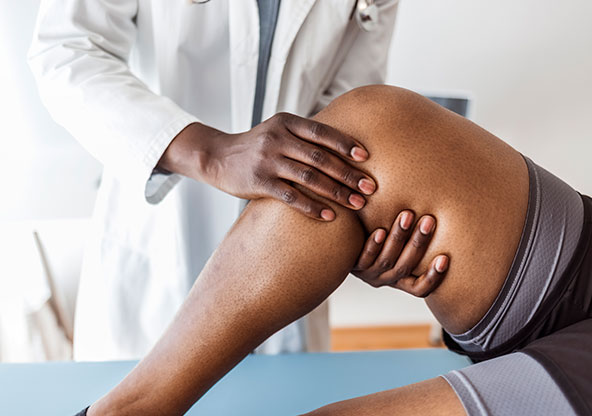5 Key Factors for Selecting a Sports Medicine Orthopedic Surgeon
With sports injuries, not all health care providers are created equal. If you're an athlete or someone who leads an active lifestyle, you'll want to consider a few key factors when choosing an orthopedic surgeon specializing in sports medicine.
Are They Fellowship-Trained?
Orthopedic surgeons with fellowship training in sports medicine have undergone additional training. Fellowship-trained means a medical doctor has completed additional specialized training in a specific field after residency.
The additional training is usually one to three years long and provides in-depth, focused experience in a particular area of medicine.
An orthopedic surgeon with a fellowship in sports medicine will gain skills and knowledge that more effectively treat athletic injuries.
"A lot of fellowships, they're able to really dial in the learning curve," said Dr. Trevor Wait, a sports medicine orthopedic surgeon at Longview's Orthopedic and Sports Medicine Institute.
This fellowship allows specialists like Dr. Wait to provide tailored and comprehensive care for athletes, including the latest surgical techniques and treatment options. It also enables him to offer a more nuanced and comprehensive approach to care.
During a fellowship, doctors work closely with experienced mentors, participate in research, and often teach medical students or residents.
They also gain hands-on experience diagnosing and treating conditions specific to their specialization.
Do They Understand Athletes?
Sports medicine specialists understand athletes' unique needs and challenges. They are well-versed in the types of injuries that athletes are most likely to suffer and the best treatment options.
"I was an athlete. I enjoy sports, competition, being able to relate with patients on that level can help an orthopedic surgeon give better care," Dr. Wait said.
Dr. Azael Arizpe who is a fellowship trained sports medicine surgeon in Tyler was also an athlete. Growing up and playing sports in the city where he works, he understands the needs and concerns for athletes in Tyler.
Understanding the differences between patients, such as professional athletes, high school athletes and older active adults, is critical to providing personalized treatment.
“Everyone needs care tailored to where they are in life,” said Dr. Azael Arizpe, who recently joined the CHRISTUS Orthopedic and Sports Medicine Institute in Tyler.
The focus is on managing athletes and active patients by customizing and tailoring programs to suit their needs. It's essential to be aware of the rehab process and anticipate how it will play out to provide the best options for recovery.
When an athlete sustains a sports injury, treatment involves managing the injury and preventing further damage.
Do They Provide Comprehensive Care and Personalized Treatment?
Look for a surgeon who offers various services, from preventive care to surgical intervention and post-operative rehabilitation.
Every athlete is different, and a good sports medicine specialist will offer personalized treatment plans tailored to your specific needs and goals.
Your health care journey should be as smooth as possible, from diagnosis to treatment and recovery. That’s why a sports medicine doctor partners with a physical therapist.
"Physical therapy and sports go hand in hand, being able to ramp up any treatment options we need to dial in physical therapy," Dr. Wait said.
Are They up to Date on Research and Innovation?
Choose a surgeon who stays current with the latest advancements in sports medicine, which could include new surgical techniques or innovative treatment options. Additional training gained from a fellowship makes this possible.
Sports injury treatment may include physical therapy, pain management, and surgical intervention. The goal of treatment is to help the athlete recover and regain strength and mobility while minimizing the risk of future injuries.
Trust and Comfort
One of the most crucial factors in choosing a sports medicine orthopedic surgeon is your level of trust and comfort during interactions. A surgeon should take the time to understand your specific needs, answer all your questions, and explain your treatment options in a way that makes you feel informed and confident.
Feeling comfortable with your surgeon can significantly impact your overall experience and recovery. A surgeon who makes you feel at ease is more likely to create a positive experience, reducing stress and anxiety, which can positively affect your recovery.
"Being able to relate with patients on their level can help an orthopedic surgeon give better care," Wait said.
This rapport can make all the difference in your journey to recovery, making it essential to consider when choosing your sports medicine specialist.


